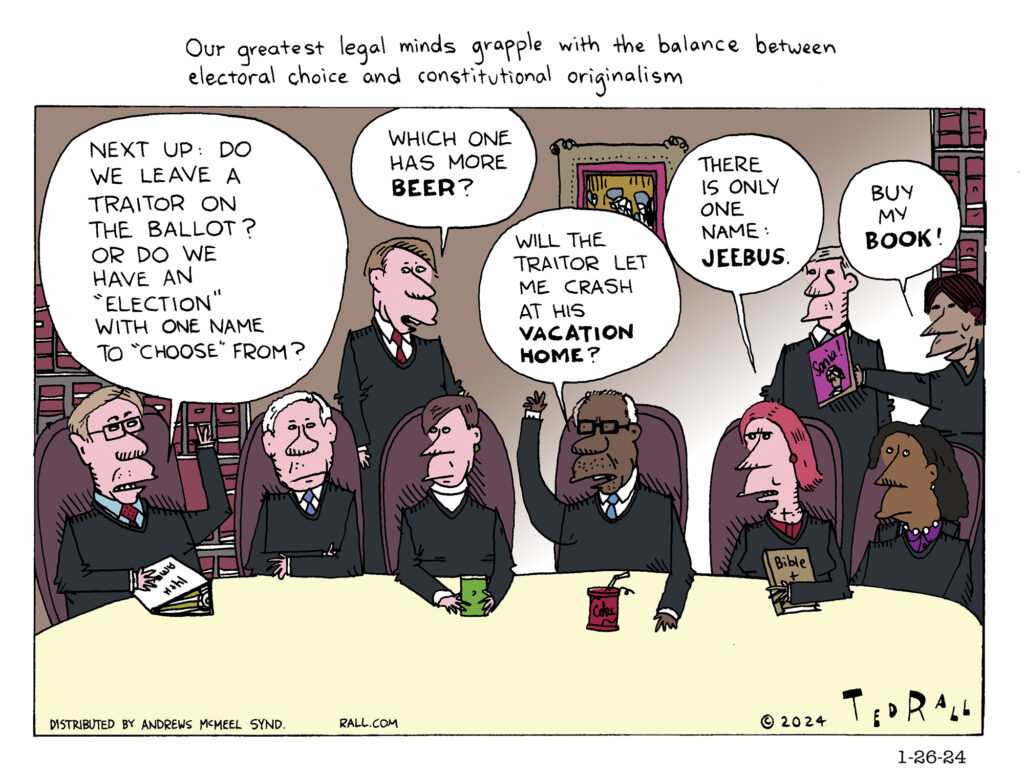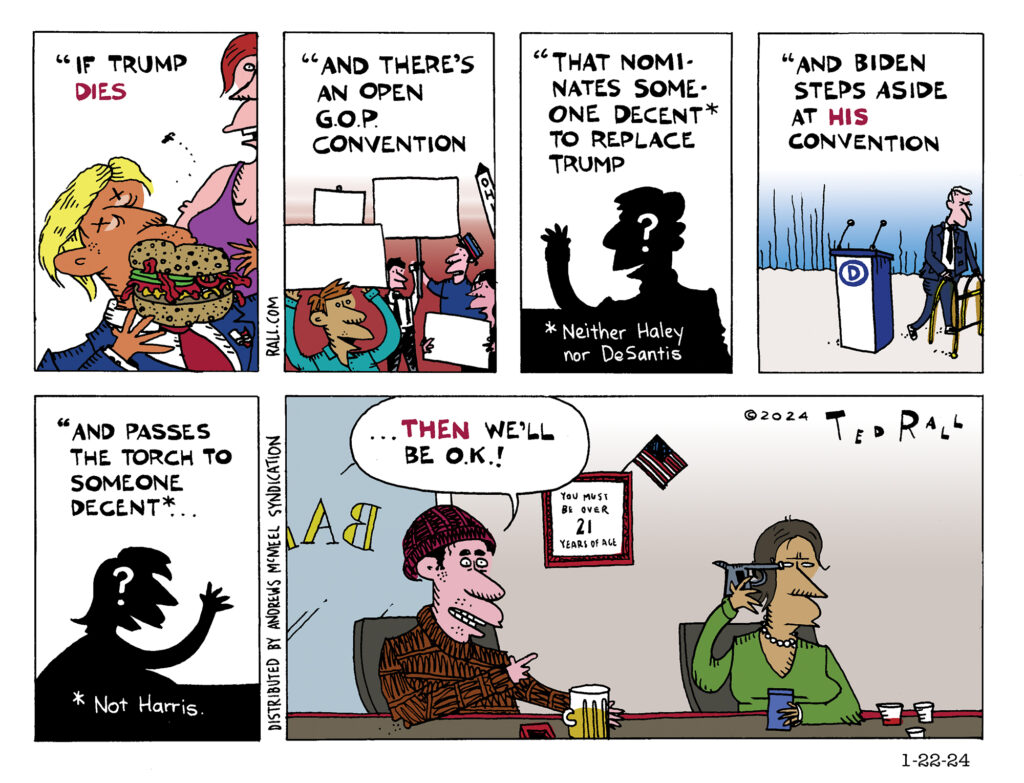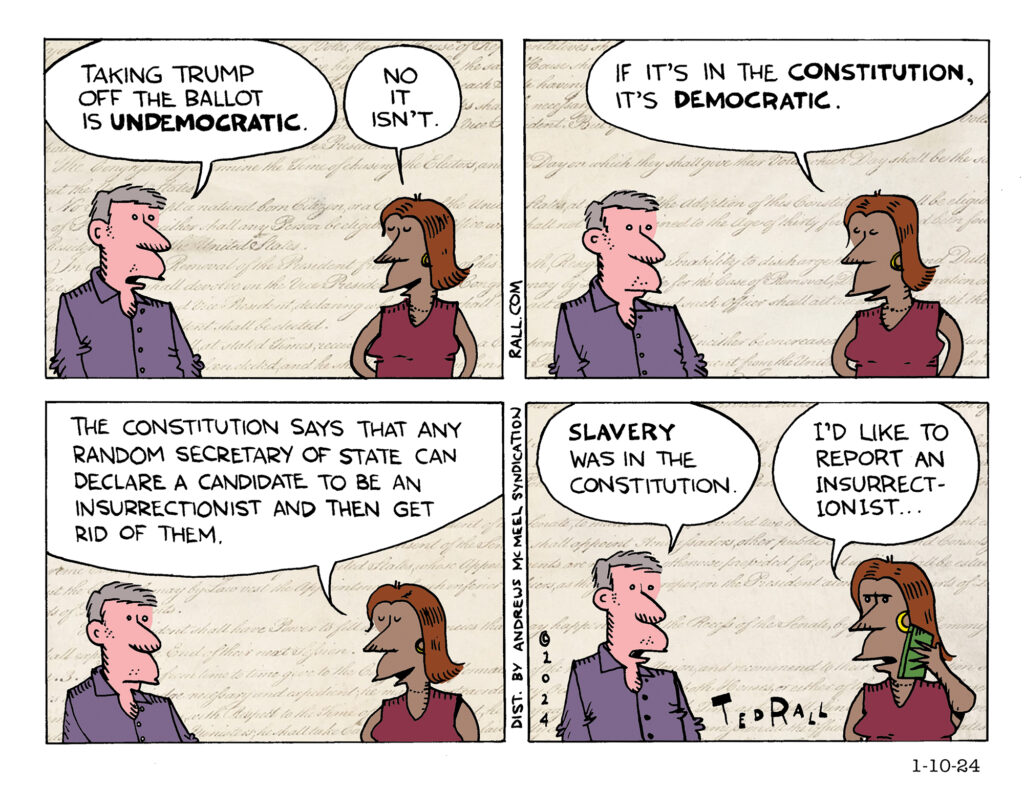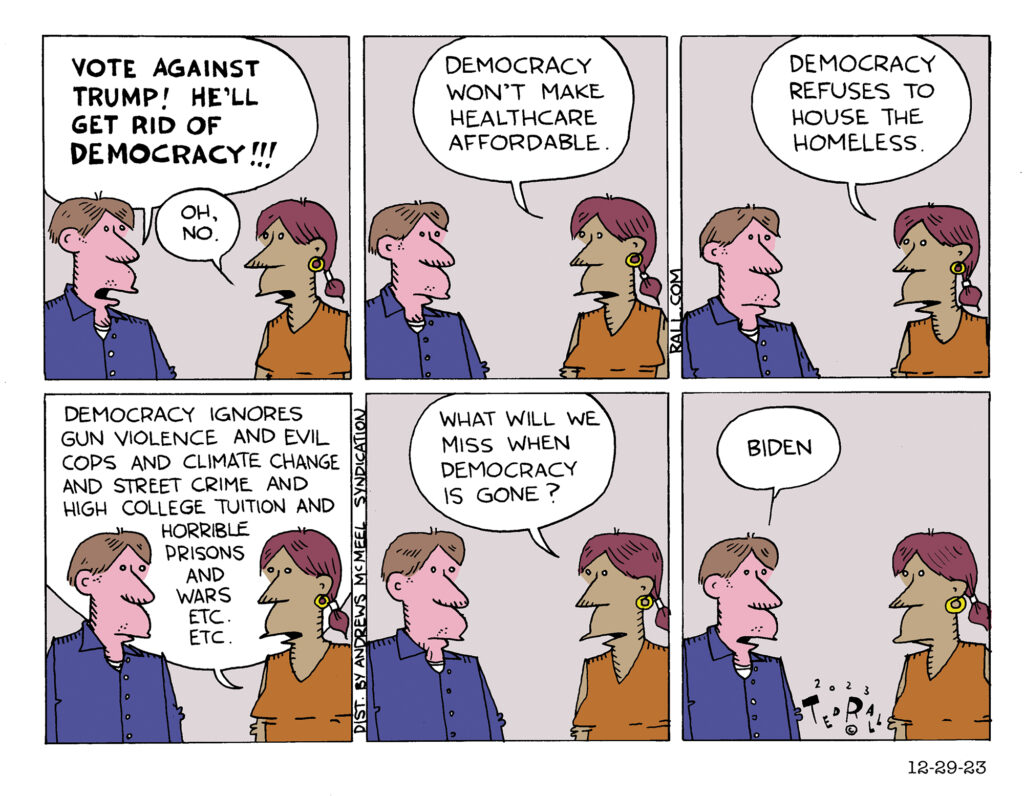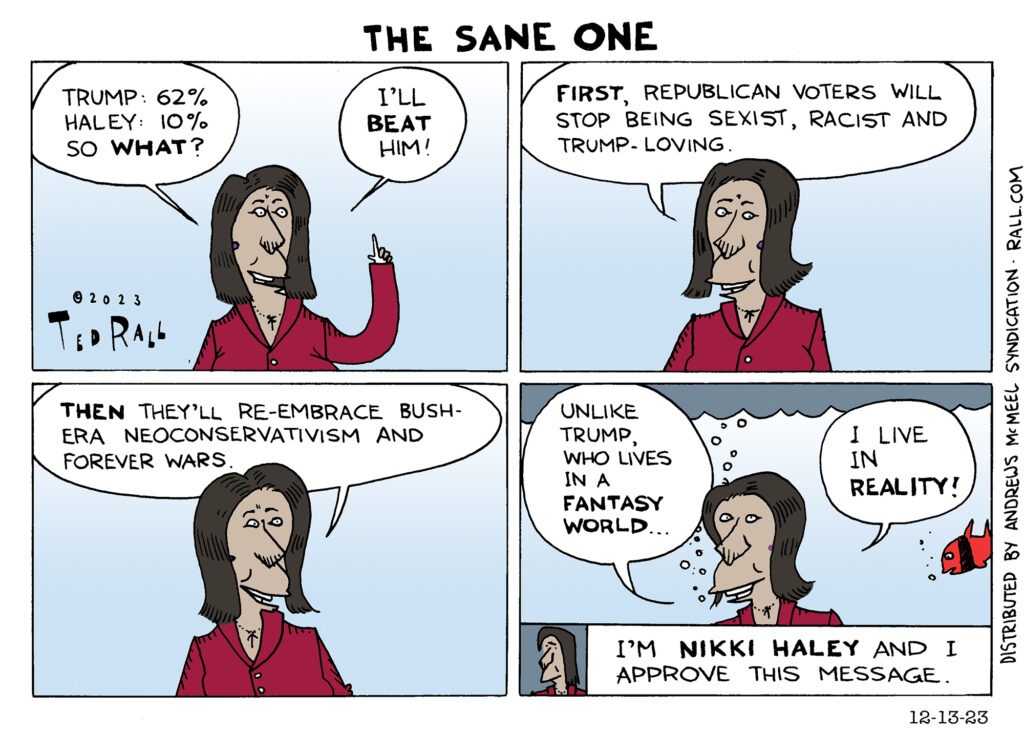Democrats say that Donald Trump is incredibly dangerous and cannot be allowed to ever be president again. If they really feel that way, why are they re-nominating Joe Biden? It’s not like he’s the strongest possible candidate.
Official Lies Aren’t What They Used To Be

The government’s services keep getting worse.
Even their lies.
The Bushies told us we had to invade Afghanistan to catch Osama bin Laden and then to go into Iraq because Saddam had WMDs. As the Pentagon knew, bin Laden was already in Pakistan; as Hans Blix and Scott Ritter told us, there was no evidence Saddam had proscribed weapons.
Sure, they were lies. But they were plausible lies. Theoretically, UBL might have snuck into Afghanistan. Saddam might have acquired WMDs. Those things could have been true.
Now they’re giving us implausible lies. Not only are their lies, well, lies—they say things that are untrue and can’t possibly be true and that no one, no matter how stupid or uninformed, could believe.
Democrats go on and on about how nothing is more important than defeating Trump. Democracy itself hangs in the balance! After Trump redux, the re-deluge. Like Hitler, but worse.
But they don’t really believe that. If liberals really actually thought Adolf Trump was going to suspend the constitution and send his enemies—them—to camps, their sense of survival would have prompted them to select the most charismatic, brilliant, popular, vigorous, 2024 Democratic presidential nominee possible. Instead, they gave us Biden.
You can’t think Trump is dangerous and go with Biden-Harris. For Democrats, protecting their party’s corporatist status quo matters more Trump’s purported threat to democracy. That’s the truth. We all know.
Republicans won’t shut up about out-of-control deficit spending and the $34 trillion national debt which, according to them, will tank the economy because, like a family that has to live within its means except for credit cards and student loans and car loans and home mortgages, the government can’t keep spending cash it doesn’t have even though it owns the U.S. Mint and has gotten away with it for, like, a century.
We know that the fake deficit hawks don’t actually believe what they are saying in real time, as they’re saying it, because while they’re threatening to shut down the government every few months, they keep throwing even more billions of dollars at the Defense Department than the DOD even asks for, so much that the military sucks up more than everything else the government does combined, and that’s not including the wars they put “off the books” and the proxy wars and the wars they charge to the State Department, not to mention debt service on old wars.
These diametrically opposed lines of rhetoric represent a dramatic shift away from old-fashioned political hypocrisy. If the military is your biggest expense by far and you keep raising it, and you claim to worry about spending, you are lying. No amount of cognitive dissonance can convince us otherwise. You know we know it’s crap yet you keep right on going.
“Normal” communication by political elites has become prima facie impossible to take seriously.
We used to be able to accept the announcement by a defeated primary candidate that they would endorse their rival and tour for him because primary campaigns involved incremental ideological variations and hadn’t yet devolved to bloodsport.
No more. Even after Trump implied that Ted Cruz’s father assassinated JFK and had his surrogates impugn Ron DeSantis as a eunuch and a fey cuck, he collected both men’s endorsements. Hillary Clinton and Joe Biden red-baited Bernie Sanders as an existential threat to the Democratic Party yet were rewarded with his fealty. This, we are supposed to think, is adults being adults and maybe this is so, but more than that it’s proof positive that nothing any primary candidate claims to stand for or against should ever be trusted.
Everywhere we look, politicians are deploying lies whose obviousness is evident out of the gate. Elites will never be believed, they know it, and they don’t care.
Israel’s war cabinet tells its traumatized citizens that October 7th came as a surprise at the same time countless specific warnings and the IDF’s eight-hour response time (!) prove that cannot possibly have been the case. As people shout “bring them home,” Prime Minister Benjamin Netanyahu says he’s trying to do just that. But that’s a lie and it has to be a lie because you don’t bomb a place where hostages you care about are being held lest you kill them and anger their captors.
Families of the doomed hostages cannot believe him and do not believe him yet they do not demand that the bombs stop falling or that those who drop them be removed from power.
Ukraine, they say, is a fellow democracy even though it has canceled all elections forever and its press is censored and opposition parties are banned, and as a democracy it must be defended by us, who are not really much of a democracy either as Dean Phillips and Marianne Williamson and others who have been denied access to ballots can attest. The idea that this famously corrupt post-Soviet republic could have posed as a democracy was cute on its face, of course…shut up and fly your blue and yellow flag.
Taiwan, Biden says, is a country that must be defended from a Chinese invasion. At the same time, Biden also says, Taiwan is not a country at all nor should it become one, China is the One China and Taiwan is part of it so China can no more invade Taiwan than the U.S. can invade Ohio, but still, we’ll defend Taiwan but really we won’t. “Realists” call this “strategic ambiguity“ but really, it’s just one of those lies-you-see-coming.
Gender identity, woke elites insist, is not merely psychological but physically real as well: a transwoman is a woman, period. This cannot be true; a transwoman swimmer is not generically the same as her cis female competitors but they tell us that we should tell cis female athletes to chill, it’s not an issue when clearly it’s an issue but the authorities don’t want us to take their ridiculous word for it, just as it is with DEI and its clumsy flip-replacement of one form of systemic discrimination with another, they just want us to shut up.
The era of the lie-you-know-from-the-start may be over soon.
Next up: insane truths without the thinnest varnish of deception.
Though not a renowned rhetorician, our president surely deserves historical credit as the first American leader to say, at the start of a war, that we will lose. Days after the U.S. military began what it plans to be a prolonged bombing campaign against Yemen, an effort to stop the Houthis from attacking ships in the Red Sea, Biden announced that future strikes would not succeed. “Are they [US airstrikes] stopping the Houthis? No,” Biden told reporters. “Will they continue? Yes.”
They’re not even trying anymore.
(Ted Rall (Twitter: @tedrall), the political cartoonist, columnist and graphic novelist, co-hosts the left-vs-right DMZ America podcast with fellow cartoonist Scott Stantis. You can support Ted’s hard-hitting political cartoons and columns and see his work first by sponsoring his work on Patreon.)
It’s Democratic If the Constitution Says It
Democratic-aligned pundits and legal experts argue that removing Donald Trump from the presidential ballot, as the Colorado Supreme Court and Maine’s Secretary of State recently decided to do and 12 other states are considering, is not inherently undemocratic because, even though it takes one major presidential candidate off the ballot in a two-party system it’s permitted under an obscure section of the 14th Amendment. Unfortunately, the Constitution hasn’t always been a charter that upheld the highest ideals of democratic participation.
When the Constitution Threatens Democracy

The Supreme Court faces a quandary: It must choose between democracy and the Constitution.
Compared to Trump v. Anderson, the notorious case of Bush v. Gore was a straightforward affair: it should not have been heard. Because elections are administered by the states, the Florida Supreme Court’s 2000 ruling ought to have been the last word. The recount should have continued. Setting aside the noxious optics of a party-line court deciding an election, the Supreme Court’s decision to hear Bush in the first place was unconstitutional.
That view is bipartisan. Sandra Day O’Connor, the justice who cast the tie-breaking vote in the 5-4 decision, eventually conceded that she regretted her partisan hackery. The court declined to officially publish Bush so it can never be cited as a precedent, a tacit admission that it made lousy case law. Chief Justice John Roberts, who subsequently spent much of his nearly two decades on the bench trying to restore the court’s tarnished reputation, never wanted his court to hear another election dispute.
With attempts to remove Donald Trump from the ballot on the ground that he’s disqualified under the 14th Amendment’s prohibition against insurrectionists holding high office spreading from Colorado to Maine to dockets in 14 other states, the Roberts court has no choice but to weigh in. States need the guidance of an across-the-board standard issued by the nation’s legal referee.
This train wreck reminds me of how, as late as the 1970s, European beachgoers were occasionally still getting blown up by mines placed during World War II; old and forgotten doesn’t always mean dead and gone. Section 3 of the 14th Amendment should have been repealed 150 years ago. Sadly for the Republic this legal time-bomb, long hidden in plain sight, is finally going off.
Ratified in 1868 just after the Civil War, the 14th Amendment’s prohibition on citizens who had participated in insurrection or rebellion from holding high office was soon rendered obsolete, a legal version of the human appendix, by the postwar Ulysses Grant Administration’s blanket Amnesty of 1872. In a bid to reunify a fractured nation all former officers of the Southern government, including notorious figures like former Confederate President Jefferson Davis and John C. Breckinridge, the U.S. Vice President from 1857 to 1861 who became the Confederacy’s Secretary of War, received pardons.
The forgiveness was real. Nine former Confederates were elected to Congress including Alexander Stephens, the former Confederate Vice President. President Grant encouraged Breckinridge to reenter politics but he declined.
For all practical purposes, Section 3 died at the age of four. (Which is why there’s no helpful case law.) Yet, like the New York “blue law” that makes it a crime to carry an ice cream cone in your back pocket in public on Sundays, this historical curio has remained on the books since the era of the horse and buggy, forgotten until some enterprising attorneys for some plaintiffs in Colorado resuscitated this legal relic for their novel assault against Trump.
Rep. Jamie Raskin (D-MD), a former constitutional law professor, argues that the 14th Amendment can’t isn’t undemocratic because it’s in the Constitution: “If you think about it, of all of the forms of disqualification that we have, the one that disqualifies people for engaging in insurrection is the most democratic because it’s the one where people choose themselves to be disqualified.” Slavery was in the Constitution too.
Trump has such a commanding lead in the primaries that he will almost certainly be the Republican presidential nominee. We have a two-party system. You don’t have to be a constitutional scholar to see that knocking one out of two of the major-party presidential candidates—who happens to be ahead in the polls—off the ballot is inherently undemocratic as well as a perfect recipe for political unrest.
The last time a major presidential candidate didn’t appear on some state ballots was Abraham Lincoln in 1860. Trouble ensued.
Trump probably deserves to be disqualified. But this is not about him. Disenfranchising tens of millions of his supporters would be deeply destabilizing to democracy. How better to feed into Trump’s narrative that our elections are rigged than to deprive voters of the basic choice to vote for or against him?
The plain language of the 14th Amendment does not offer much hope to Trump and the Republicans as they argue before a Supreme Court dominated by originalists. The Colorado Supreme Court was probably correct when they determined that the offices of president and vice president were originally intended to be covered by the provision. There is a strong argument that January 6, 2021 qualified as an insurrection or rebellion as the amendment’s drafters understood those terms in 1866. Section 3 appears to be intended to be self-executing, meaning that appeals to due process are unlikely to prevail; like it or not, a secretary of state or state supreme court can simply look at Donald Trump and declare: I see an insurrectionist. Section 5, which allows Congress to make such a determination, describes a non-exclusive right.
If the Roberts court follows Section 3 to the letter, Trump will be disqualified.
Theoretically, Congress could solve this dilemma. A two-thirds vote in both the House and the Senate would allow Trump to remain on the ballot. Democrats could declare that they value democracy so much and have so much confidence in American voters to do the right thing in a fair election that they would provide the necessary support. But such an extraordinary gambit would require statesmanship, risk-taking and putting patriotism above party, traits in short supply on Capitol Hill.
We Americans venerate the Constitution. But Section 3 of the 14th Amendment is a nightmare. Given the choice between correctly interpreting the original intent of its Reconstruction-era drafters and allowing the 2024 election to proceed as normally as possible given the advanced ages of both frontrunners and the legal perils faced by Trump, the Supreme Court construct a convoluted rationale for, say, why the presidency isn’t a government office or how the 14th contains an implied right to due process.
The Supreme Court should ignore the Constitution, gin up a BS justification to keep Trump on the ballot and choose democracy.
(Ted Rall (Twitter: @tedrall), the political cartoonist, columnist and graphic novelist, co-hosts the left-vs-right DMZ America podcast with fellow cartoonist Scott Stantis. You can support Ted’s hard-hitting political cartoons and columns and see his work first by sponsoring his work on Patreon.)
DMZ America Podcast #129: Trump Dumped from Colorado Ballot, Biden’s Record-Low Polls, Will Anyone Care When Gaza is Gone? (with guest Rob Rogers)
In the latest DMZ America Podcast, editorial cartoonists Ted Rall (from the Left) and Scott Stantis (from the Right) are joined by their colleague Rob Rogers, editorial cartoonist formerly of the Pittsburgh Post-Gazette.
First up: The political world reeled after the Colorado state Supreme Court issued a stunning ruling declaring Donald Trump an insurrectionist under the 14th Amendment to the Constitution, thus making him ineligible to appear on the ballot in the upcoming state Republican primary. 13 other states are facing similar lawsuits so the U.S. Supreme Court is expected to weigh in on whether Trump can appear on the ballot. Will judges decide our next president?
Second: President Biden is suffering from the lowest poll numbers of his presidency, bottoming out at 34% in one survey. He is even losing voters aged 18 to 29, an important part of his coalition back in 2020. Now he’s between a rock and a hard place on issues like Gaza. Is there any way that he can possibly turn this dismal situation around, given the fact that no one who his position has gone on to successfully be re-elected?
Finally: Most of the world now agrees that Israel overreacted to the October 7 terrorist attack by Hamas. Gaza has been flattened. Will the attention of the world move on after the bombing stops? Or will images of shattered millions of Palestinian refugees living in the Egyptian desert prove to be a political game changer during the election next year?
Watch the Video Version of the DMZ America Podcast:
DMZ America Podcast Ep 129 Sec 1: Trump Dumped from Colorado Ballot
DMZ America Podcast Ep 129 Sec 2: Biden’s Record-Low Polls
DMZ America Podcast Ep 129 Sec 3: Will Anyone Care When Gaza is Gone?


